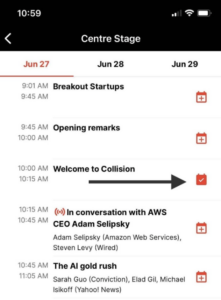The air in the city is electric with anticipation for Collision, Toronto’s tech scene is about to transform into a vibrant epicentre of innovation and possibility! We couldn’t be more thrilled for the global startup ecosystem to make its way to the city we proudly call home. As longtime Collision-enthusiasts, we’re sharing our insider tips on how to thrive at the 3-day conference.
From June 26-29, the city will be buzzing with excitement as the world’s brightest minds come together for a week to network, share big ideas and dive into cutting-edge technologies.
Picture this: 40,000+ attendees, 1250+ journalists, 250+ partners and 950+ investors coming together under one roof to reimagine the global tech industry. And the fun doesn’t end there; industry experts tackling the biggest challenges facing our industry today will take the stage to share their insights on navigating uncertainty.
Amidst all this buzz, DMZ is also gearing up for its most prominent presence at Collision to date. This year, we’re uniting the most fearless and diverse visionaries in the global startup ecosystem to mark the year of the camel startup.
At the fastest-growing tech conference in North America, the opportunities are endless. To help you make the most of your time at Collision, we’ve compiled a handy guide with our top tips for startups. Read on for a download of our top startup tips to get the most out of the week.
Create a plan of attack
 Your time is valuable. Before attending any event, it’s crucial to do your research and plan ahead. When planning your schedule, start by reviewing the various sessions and identifying the ones that best align with your needs.
Your time is valuable. Before attending any event, it’s crucial to do your research and plan ahead. When planning your schedule, start by reviewing the various sessions and identifying the ones that best align with your needs.
You can build a personal event schedule on the Collision app by tapping the ‘Schedule’ tab at the bottom of the app. Tap the calendar icon to any must-see sessions to add to your own personal schedule.
Don’t forget to explore the multiple stages and booths across Enercare Centre, including DMZ’s booth (booth E281). Swing by to connect with angels and VCs in the ecosystem and check out our dedicated DMZ stage and startup showcase, win prizes and much more! If you’re lucky, you might also catch a glimpse of a certain 6-foot-tall animal hanging around our space.
For additional insights, check out Collision’s essential guide, which provides registration information, venue details and travel suggestions.
Set clear objectives
Given the scale of Collision, it’s important to define your objectives beforehand. Upon doing your research and planning your schedule, set intentions and determine what you want to achieve from the conference.
A clear goal could sound something like this, “I will lock in 5 meetings with CEOs who could benefit from my solution and follow up with my pitch deck before July 1.” Put it in writing and commit to it!
Utilize the power of networking
With over 40,000 attendees and 2,000 startups, Collision offers immense networking opportunities. Be sure to make a list of speakers and entrepreneurs you want to connect with to maximize your time.
We suggest taking full advantage of this opportunity by checking out the alpha and beta startup sections, actively engaging with thought-provoking speakers and attending educational masterclasses and Q&As.
Not to mention, DMZ’s booth will feature its very own networking lounge for 1:1 meetings with investors, startups and industry leaders.

Don’t skip out on workshops
Make the most of Collision by participating in expert-led workshops. Here are a few sessions that might pique your interest:
-
Metaverse: The road to a trillion-dollar industry
- Julie and Alan Smithson (Metaverse)
- Hosted by DMZ – 4:30 PM, June 27th
- Julie and Alan Smithson (Metaverse)
-
The power of community for your brand
- Chelsee Pettit (aaniin)
- Hosted by DMZ – 2:00 PM, June 28th
* The first 15 attendees will win a limited edited Tkaranto t-shirt from Chelsee’s brand, aaniin!
- Hosted by DMZ – 2:00 PM, June 28th
- Chelsee Pettit (aaniin)
-
Startup Legal Essentials
- Allan Goodman (Goodmans)
- Hosted by DMZ – 3:00 PM, June 28th
- Allan Goodman (Goodmans)
-
Is venture capital right for you?
- Phil Joseph (Rep Matters)
- Hosted by Rep Matters, at DMZ’s booth – 11:30 AM, June 29th
- Phil Joseph (Rep Matters)
-
Founder Fireside: Torys and Meroxa
- Konata Lake (Torys) and DeVaris Brown (Meroxa)
- Hosted by DMZ – 11:00 AM, June 29th
- Konata Lake (Torys) and DeVaris Brown (Meroxa)
Oftentimes smaller-knit and more intimate, these sessions will provide valuable insights while giving you a real opportunity to engage with speakers. For more information on the exciting sessions taking place at DMZ’s booth, check out our full schedule here!

Don’t be afraid to tell your story
Collision will attract over 1,250 journalists from prestigious publications such as The New York Times, Wall Street Journal, Betakit, The Peak, The Globe and Mail and many more! Leverage this opportunity by putting your startup front and centre. Media at the event will be wearing a slightly different badge than regular attendees, keep your eyes peeled and don’t be shy to approach them and spark up a conversation.
Remember to wear your startup swag, bring business cards and have your Linkedin QR code and Collision app on hand so you’re ready to connect.
By following these five tips, you’ll be well-prepared to maximize your Collision experience. We can’t wait to see you there!

